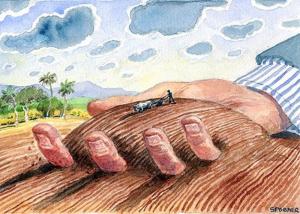Reports of widespread incidences of territorial violence and land-based conflict in the developing world saturate international news. However, one form of land violence, the commercial acquisition of lands belonging to the world’s marginalized by large corporations, goes unreported.
Colloquially known as “land grabs,” these acquisitions involve government sales of occupied lands to foreign investors and often intensify land tensions in the area. The International Land Coalition defines “land grabs” as land investments rooted in a lack of consent or consensus amongst local affected peoples, coupled with a deliberate lack of transparency or environmental impact awareness[1]. This problem is incredibly widespread, with an area the size of London sold off to developers every six days[2].
Rates of hunger, both in the West and the global South, are rising exponentially, and are exacerbated only by irresponsible land development. The land “grabbed” in the last decade alone, if utilized for subsistence farming, could feed an estimated billion of the world’s poor[3]. Despite this, much of the land is being used instead for crops intended for export, or in some cases, the development of biofuels. This represents an irresponsible and unsustainable investment, which ultimately does little to help local economies. In some cases, land conflict can further existing political tensions between the government and the landless.
In Honduras, despite legislation that promises selected areas of land for the exclusive use of smallholders, much of this cooperative land has been sold by the government to large landholders, who ultimately hire the smallholders for little pay[4]. Similarly, rapid expansion of palm oil production in Indonesia has threatened the lives and livelihoods of smallholders in the country. In both cases, similar to those of much of the developing world, this has led to incidences of land displacement. When proper legal procedure fails, the displaced are forced to resort to more incendiary measures, such as land occupations, which can often result in violent conflict. Some groups have taken to the international stage to act out against this injustice, voicing their concerns and telling their stories to international organizations such as the World Bank, which has a history of investment in “land grabs.”
While the world’s population and its corresponding demands for food and fuel grow, land grabs are likely to increase in proportion. International non-governmental organizations such as Oxfam and the International Land Coalition (ILC) denounce land grabs as impediments to global development, damaging the lives and livelihoods of citizens of the global South. The ILC’s land reporting initiative, in particular, seeks to gather more data on the impact of this relatively nascent issue on the world’s poor strengthening advocacy and policymaking surrounding land grabs[5].
This begs the question of what we, as North American university students can do to voice our opposition to the issue of land grabs in the developing world. To begin, you can sign Oxfam’s petition to the World Bank to freeze investments in land until a fair standard can be set. Similarly, take a look at the companies that produce your favorite products to make sure that they are not complicit in practices of land grabbing. Check out the International Land Coalition’s sister website, commericalpressureonland.org, which details the steps that activists around the world are taking to combat land grabs. Finally, the Via Campesina, an international peasant activist network, has designated April 17th as the International Day of Peasant Struggles, calling for mobilization against this hyper-commercialization of land needed for smallholders. By keeping yourself informed, and by exercising your power both as a consumer and an activist, you can help play a valuable role in the prevention and freezing of irresponsible land acquisition and investment.





